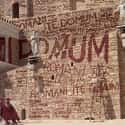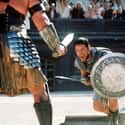-
(#4) All Romans Spoke - And Understood - The Same Language
The Trope: Everyone in the Roman world spoke the same language and totally understood one another.
Why Is It Inaccurate? Movies are going to present Ancient Rome in a language the audience can understand, naturally. To a certain extent, there's a truth in a common language used among Romans. Latin was an administrative language in the empire, used by government officials and incorporated into military terminology for overall comprehension. That said, Latin was not the native language of most inhabitants of the greater Roman Empire.
As the Romans expanded their influence throughout Europe, into the eastern Mediterranean and across North Africa, they came into contact with numerous native languages. Different dialects of Latin took shape over time. Similarly, Latin influenced native languages present in these regions, a phenomenon seen in law and cultural practices, as well.
Notable Offenders: Monty Python's Life of Brian, Gladiator, The Last Legion, The Eagle, Gladiator, Rome (TV series)
-
(#10) Gladiators Always Fought To The Death
The Trope: Gladiatorial combat was a fight to the death for at least one, if not both, of the combatants. Onlookers enjoyed the spectacle of blood and carnage that unfolded before them, as criminals, prisoners of war, and slaves vied against one another for survival.
Why Is It Inaccurate? Gladiators were well-trained athletes and valuable commodities. Gladiators were managed by lanistae, men who invested a lot of money into their fighters. Because of this, it was in everyone's interest, including the crowd, to keep a gladiator alive and bring him back for future fights. Most gladiatorial contests ended in a serious wound (seen in the skeletal remains of gladiators) or when one of the two men ran out of energy.
Some gladiators may have been slaves or criminals at one point in their lives, and many were held in high regard - later freed when their days of fighting came to an end. Evidence suggests gladiators could even retire and become trainers in their own right.
Notable Offenders: Gladiator, Spartacus, Shadow of Rome (video game), Colosseum: Road to Freedom (video game), Rome (TV series), Spartacus (TV series)
-
(#8) Romans Were Exclusively White
The Trope: Roman citizens throughout North Africa, the Middle East, and into Europe were Caucasian. If they appear at all, members of what we would now call "minority groups" were slaves and servants, excluded from the benefits of citizenship.
Why Is It Inaccurate? At one point, the Roman Empire spanned the entire Mediterranean Sea, and west from the Danube Valley into Britain. The vast number of groups under Roman authority ranged in ethnicity and appearance. While popular-culture versions of ancient Rome depict an overwhelmingly white population, archaeological, historical, and DNA evidence indicates the city was much more of a cultural melting pot.
In 2019, researchers published a study that analyzed remains from 29 sites in and around Rome. According to DNA evidence, large scale migration into the burgeoning city resulted in "overwhelming" genetic diversity through 300 CE, when the population of Rome topped 1 million. Historians continue to debate the extent to which this same type of diversity may have extended throughout the Empire.
Romans themselves would not have been as concerned with ethnicity or race as they would have been with cultural and political superiority. Roman citizenship was extended to individuals and groups based on economic and military considerations, a legal award intended to instill a sense of unity among residents in the empire. It was "inferior" peoples, regardless of color, who made up the ranks of slaves in the Roman world (i.e., prisoners of war, criminals, debtors). While this could include individuals with dark skin, there were no indications citizenship was not an option for peoples of various ethnicities and appearance.
Notable Offenders: Gladiator, Pompeii, Ben-Hur (1959), The Eagle, The Last Legion
-
(#3) Women Wore Revealing Clothing
The Trope: Roman women - across social classes - wore clothes to show off a lot of skin. Revealing clothing might be worn to emphasize attractiveness and sensuality, but it could also be a not-so-subtle indication of sexual manipulation.
Why Is It Inaccurate? Women in the Roman world were prone to show as little skin as possible when they left their homes. Married women demonstrated their modesty by layering clothes, something that also reflected a fair amount of wealth.
The more items a woman had on, the more clothing she could afford. A stola (similar to a toga and made out of wool) was worn over a tunic, which was topped off by a palla over a woman's head. Unmarried women and widows were not as concerned with keeping their heads covered and may or may not have donned a palla. While married women were covered from head to toe, lower-class women may not have worn a palla because it was a hindrance to work.
Clothes were generally more colorful and elaborately decorated depending on wealth, too. Women's garments could be one or many colors, but dyes used to color clothes were expensive. Colors like purple were reserved for only the most elite members of society and not appropriate for women.
Notable Offenders: Spartacus (TV series), Gladiator, Rome (TV series), Pompeii, History of the World: Part I
-
(#7) Julius Caesar's Last Words Were 'Et Tu, Brute?'
The Trope: As Julius Caesar is attacked by his fellow senators, the final blow is struck by his dear friend Brutus. With his dying breath, Caesar expresses both shock and sadness in the Latin phrase, "Et tu, Brute?" (Which can be translated to "And you, Brutus?" or "Even you, Brutus?")
Why Is It Inaccurate? Caesar's last words are a matter of debate, even among the most ancient sources. In his Lives, Plutarch (writing between the 1st and 2nd century AD) reports that Caesar said nothing at all:
And it is said by some writers that although Caesar defended himself against the rest and darted this way and that and cried aloud, when he saw that Brutus had drawn his dagger, he pulled his toga down over his head and sank, either by chance or because pushed there by his murderers, against the pedestal on which the statue of Pompey stood.
In The Twelve Caesars, Suetonius (writing in the 2nd century AD) says historians differ on whether Caesar said nothing or addressed Brutus in Greek:
Finding himself now attacked on all hands with naked poniards, he wrapped the toga about his head, and at the same moment drew the skirt round his legs with his left hand, that he might fall more decently with the lower part of his body covered. He was stabbed with three and twenty wounds, uttering a groan only, but no cry, at the first wound; although some authors relate, that when Marcus Brutus fell upon him, he exclaimed, “What! art thou, too, one of them? Thou, my son!”
One modern scholar has a different read on Caesar's last words. Ioannis Ziogas argues that Caesar's Greek phrase, καὶ σύ, τέκνον, which can be translated to "You too, son," is actually a prediction of Brutus's doom:
The dictator’s oral epitaph predicts the death of Brutus as a consequence of his involvement in the assassination. It means "You too, son, will die." The Greco-Roman belief that a dying man can foresee the future invests Caesar’s last words with prophetic authority.
Notable Offenders: Julius Caesar (1953)
-
(#14) The 'Fall' Of The Roman Empire Happened Overnight
The Trope: One day a bunch of barbarians arrived at the gates of Rome, sacked the city, and brought the Empire to an end.
Why Is It Inaccurate? The decline of the Roman Empire took place over decades, and arguably centuries. It was not one single event that toppled the ancient civilization but several factors, including economics, disease, and even climate change.
Eventually, the empire was divided into east and west, with the capital moving from Rome to Byzantium. Byzantium became Constantinople, named for Emperor Constantine (d. 337 AD), who had been one of four tetrarchs tasked with leading the overgrown empire. When Diocletian (d. 305 AD) introduced the institution of the tetrarchy during his reign, it split the Roman Empire into two parts - with each part led by a senior "Augustus" and a junior "Caesar." This move was intended to help protect Rome with greater efficiency, to address economic crises that plagued the 3rd century, and return a sense of order to the Roman sphere of influence.
While Rome and the Western Roman Empire did continue to decline and combat migrations of barbarian groups, the city never completely fell. The sack of Rome by Alaric and the Visigoths in 410 AD is often cited as the beginning of the end, with 476 AD considered by historians the official "end" of the Western Roman Empire. In truth, it reinforced its orientation to the east.
The Eastern Roman Empire continued to thrive, and transitioned to become what is now called the Byzantine Empire. It expanded under the reigns of a handful of emperors, but gradually contracted over the ensuing centuries. The Byzantine era finally came to a close when Constantinople was sacked by the Ottomans in 1453 AD.
Notable Offenders: The Fall of the Roman Empire, The Last Legion
New Random Displays Display All By Ranking
About This Tool
Our data comes from Ranker, If you want to participate in the ranking of items displayed on this page, please click here.















